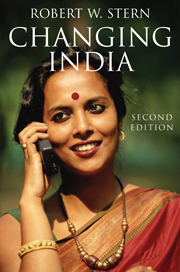Book contents
- Frontmatter
- Contents
- List of maps and tables
- Preface to the second edition
- Glossary
- Introduction: Change, the societies of India and Indian society
- Part I The changing countryside
- 1 Families and villages
- 2 Caste
- 3 Class
- 4 Homelands and states
- Part II Change from above
- Appendix One Major political events in the related histories of British imperialism and Indian nationalism, 1858–1947
- Appendix Two Major political events in the history of the Indian Union, 1947–2002
- Notes
- Guide to further reading
- Index
2 - Caste
Published online by Cambridge University Press: 18 April 2011
- Frontmatter
- Contents
- List of maps and tables
- Preface to the second edition
- Glossary
- Introduction: Change, the societies of India and Indian society
- Part I The changing countryside
- 1 Families and villages
- 2 Caste
- 3 Class
- 4 Homelands and states
- Part II Change from above
- Appendix One Major political events in the related histories of British imperialism and Indian nationalism, 1858–1947
- Appendix Two Major political events in the history of the Indian Union, 1947–2002
- Notes
- Guide to further reading
- Index
Summary
What is caste? Of all Indian social institutions, caste is the most exotic to Westerners, the furthest removed from our experience. We may look through the forms of Indian family and village life to recognize the substance of Western lives. We may have no difficulty in recognizing from Western experiences the substance of patron–client and class relationships in Indian villages. But we have no castes. We speak of “castes” when we refer to apparently impenetrable social barriers: in apartheid South Africa, for example, or in outback Australia, or in the segregationist American South. But as a composite social form, caste in India is uniquely Indian. As a composition of parts – a tapestry, to choose a convenient metaphor – caste in India is unrecognizable to Westerners. Our discomfort with its strangeness tempts us either to disparage caste's uniqueness by pulling and tugging it to fit our experiences of class and status, or to devalue Western experiences because they seem irrelevant to an understanding of caste.
Negatively put, the central commitment of this chapter is to avoid these temptations. Caste is of the warp and woof of Indian civilization, and Indian civilization is of the warp and woof of caste. We avoid the temptation to socialscience hubris by understanding that the tapestry of caste is the work over millennia of a great civilization. We may avoid the temptation to abandon as useless our own Western experiences by examining the tapestry's composition, by scrutinizing it for recognizable strands.
- Type
- Chapter
- Information
- Changing IndiaBourgeois Revolution on the Subcontinent, pp. 56 - 87Publisher: Cambridge University PressPrint publication year: 2003



